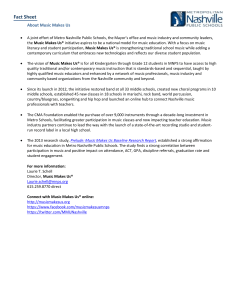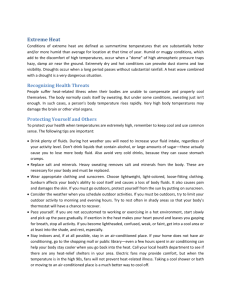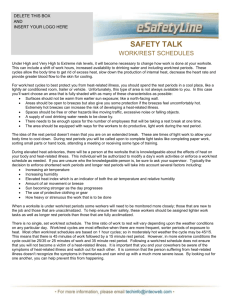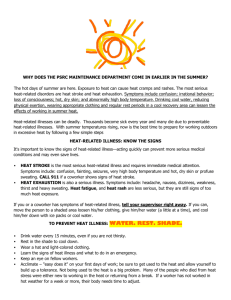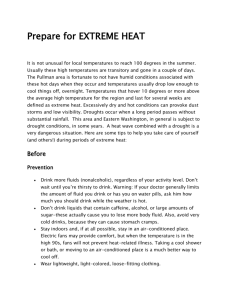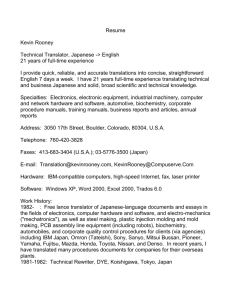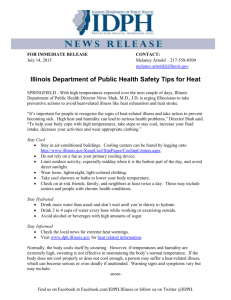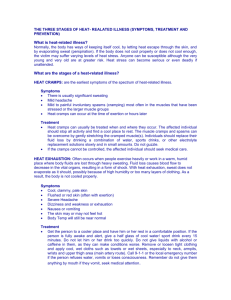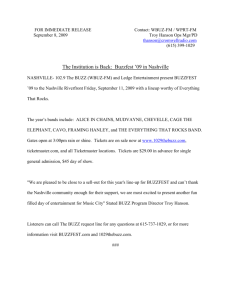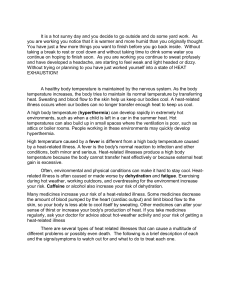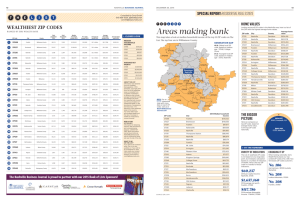click here - Nashville City Paper
advertisement
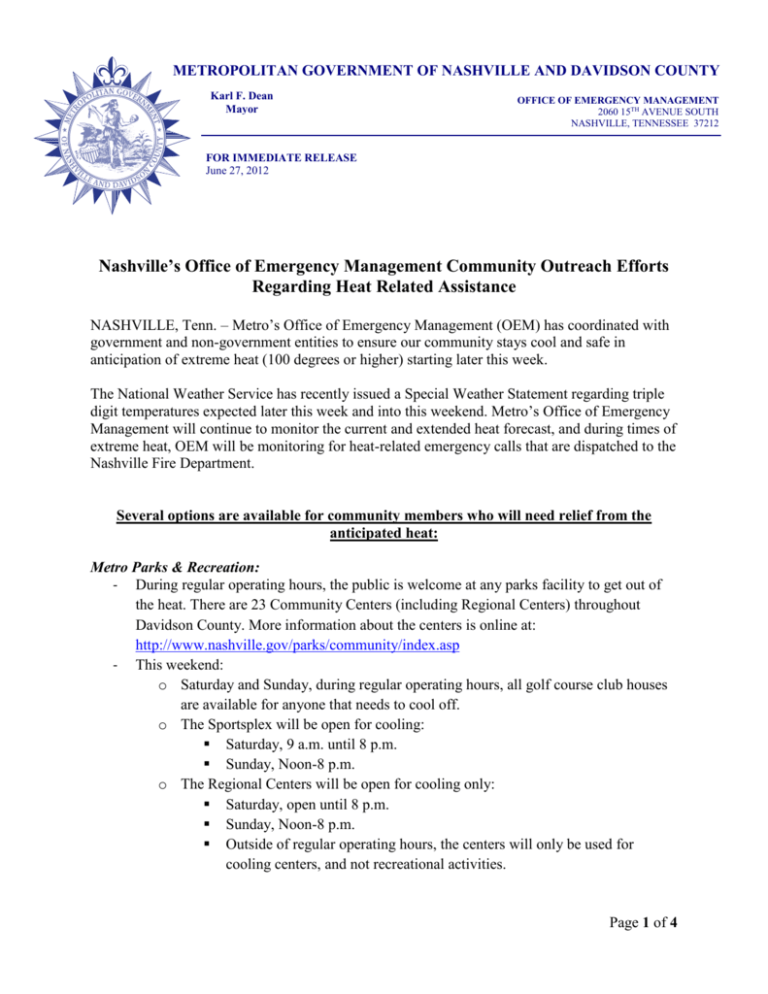
METROPOLITAN GOVERNMENT OF NASHVILLE AND DAVIDSON COUNTY Karl F. Dean Mayor OFFICE OF EMERGENCY MANAGEMENT 2060 15TH AVENUE SOUTH NASHVILLE, TENNESSEE 37212 FOR IMMEDIATE RELEASE June 27, 2012 Nashville’s Office of Emergency Management Community Outreach Efforts Regarding Heat Related Assistance NASHVILLE, Tenn. – Metro’s Office of Emergency Management (OEM) has coordinated with government and non-government entities to ensure our community stays cool and safe in anticipation of extreme heat (100 degrees or higher) starting later this week. The National Weather Service has recently issued a Special Weather Statement regarding triple digit temperatures expected later this week and into this weekend. Metro’s Office of Emergency Management will continue to monitor the current and extended heat forecast, and during times of extreme heat, OEM will be monitoring for heat-related emergency calls that are dispatched to the Nashville Fire Department. Several options are available for community members who will need relief from the anticipated heat: Metro Parks & Recreation: - During regular operating hours, the public is welcome at any parks facility to get out of the heat. There are 23 Community Centers (including Regional Centers) throughout Davidson County. More information about the centers is online at: http://www.nashville.gov/parks/community/index.asp - This weekend: o Saturday and Sunday, during regular operating hours, all golf course club houses are available for anyone that needs to cool off. o The Sportsplex will be open for cooling: Saturday, 9 a.m. until 8 p.m. Sunday, Noon-8 p.m. o The Regional Centers will be open for cooling only: Saturday, open until 8 p.m. Sunday, Noon-8 p.m. Outside of regular operating hours, the centers will only be used for cooling centers, and not recreational activities. Page 1 of 4 Nashville Farmer’s Market: - Available for anyone to go and get out of the heat, Monday-Sunday, 8 a.m.-6 p.m. 900 Rosa Parks Blvd Salvation Army: - Starting this Thursday, June 28 through next Tuesday, July 3, they will have a water station under the Jefferson Street Bridge for the homeless community. - From this point forward, anytime the temperature is 100 degrees or higher, or if a Heat Advisory is issued, they will be at the bridge. Nashville Rescue Mission: - Their current Men’s and Women’s shelters will serve as cooling centers for those that need it. - Their “Hot Patrol” will be out handing out water and doing welfare checks anytime it gets 90 degrees or higher. Extreme Heat Tips Stay cool and hydrated. Take advantage of swimming pools and other water areas. The elderly and young children should limit their exposure to heat. Offer plenty of liquids to drink, keep them in the shade and/or in air conditioning, and take care not to overdress them. Check on or make plans for someone to check on elderly relatives or neighbors to ensure they are staying cool and have access to air conditioning. Get out of the heat and take advantage of air conditioned facilities. When outdoors, stay out of direct sunlight when possible and in the shade. Wear light colored, loose fitting clothing Drink plenty of fluids to stay hydrated, but avoid alcohol and caffeinated beverages. Do not leave anyone inside a hot car during extreme heat, especially young children, and including pets. Make sure to keep pets cool and hydrated, especially during peak hours of the day. Air Conditioning Assistance The Metro Action Commission (MAC) can assist with obtaining air conditioning units if you are a Davidson County resident: - 62 years old or older, or, - disabled, or, - have a medical issue that requires you to be in a cool environment If you meet the above criteria, you can call the Metro Action Commission for assistance at (615) 862-8860, ext. 70100, or 70120. Metro Action Commission is also looking for monetary donations or air conditioning units to assist with this program. If you are interested, you can contact (615) 862-8860, ext. 70120. Page 2 of 4 Conserving Energy OEM will be in contact with the Nashville Electric Service regarding any unanticipated power outages that may last longer than 2-3 hours during extreme heat. According to NES, ways you can conserve energy and help reduce the risk of blackouts during extreme heat include: - Use appliances and other electric devises sparingly. Try limiting it to one appliance at a time. - Unplug electronic devices and charges when they are not in use. - Use cold water to rinse clothes in the washer, and line dry when you can. - Delay using hot water so that the demand on your water heater is less. - Increase the setting on your thermostat by two or three degrees. - Try using fans to increase your comfort level at the higher thermostat setting. - Close blinds and/or shades in your windows to block out the sun’s heat Heat Related Illness Residents are encouraged to take safety precautions to avoid heat-related illness. Heat related illness can affect anyone, with the elderly and children four years of age and younger at a greater risk. In addition, those who work or spend a significant amount of time outdoors need to be aware of symptoms of heat-related illness. If anyone shows signs or symptoms of heat-related illnesses, they should be moved to a cool area and medical attention should be sought immediately. Heat exhaustion is a milder form of heat-related illness that can develop after several days of exposure to high temperatures and inadequate or unbalanced replacement of fluids. Those most prone to heat exhaustion are elderly people, those with high blood pressure, and those working or exercising in a hot environment. The warning signs of heat exhaustion include the following: Heavy sweating Paleness Muscle cramps Tiredness Weakness Dizziness Headache Nausea or vomiting Fainting Heat stroke is the most serious heat-related illness. It occurs when the body becomes unable to control its temperature: the body’s temperature rises rapidly, the sweating mechanism fails, and the body is unable to cool down. Body temperature may rise to 106°F or higher within 10 to 15 minutes. Heat stroke can cause death or permanent disability if emergency treatment is not provided. Warning signs of heat stroke vary but may include the following: An extremely high body temperature (above 103°F) Page 3 of 4 - Red, hot, and dry skin (no sweating) Rapid, strong pulse Throbbing headache Dizziness Nausea Confusion Unconsciousness Page 4 of 4
